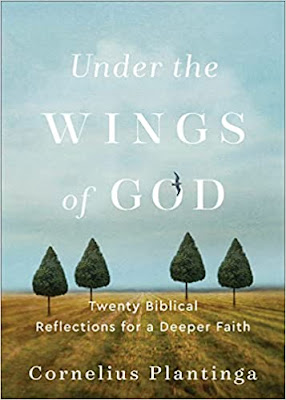Under the Wings of God (Cornelius Plantinga) -- A Review
UNDER THE WINGS OF GOD: Twenty Biblical Reflections for a Deeper Faith. By Cornelius Plantinga. Grand Rapids, MI: Brazos Press, 2023. 182 pages.
We can
all use words of wisdom and guidance when it comes to living the Christian
life. That's especially true in challenging times, such as the ones we’ve been
experiencing, times when one wonders whether the path of faith is workable. Although
religion isn’t disappearing from the face of the earth, at least in the North
American/European scene, we live in a secular age. Religion and spirituality in different forms
seem present everywhere, but institutional religion seems to be struggling, at
least in some parts of the world. The challenge that we have been facing is
that religion/faith can be rather thin, that is, it’s not very deep. Such forms
of religion/faith are easily hijacked by cultural and political movements (such
as Christian nationalism). What is needed is a more thick faith, one that is
not easily hijacked by movements that run counter to our faith traditions. In Under the Wings of God, Cornelius
Plantinga offers us twenty reflections that seek to help the reader ground their
faith commitments deeply in the biblical story.
Each of
the reflections is rooted in a particular biblical text, and Plantinga tells
the reader not to ignore the readings from Scripture. He writes: “The
reflections won’t nourish you much if you remain unfamiliar with these
readings. Dive into them. Ponder them. Think them over. If you do, what I have
to offer will then make a lot more sense” (p. 3). In other words, this is not a
book designed for a quick read and then a prayer. It will take a bit more of our
time. Many of the texts and reflections address difficult questions of faith
and life, inviting us to wrestle with the implications of the passage for our
lives.
The
readings/reflections cover a variety of topics. To give one example, the third
reflection, which is titled "With All Your Mind," is based on readings
from Deuteronomy 6 and Matthew 22. In this reflection, Plantinga invites us to
consider what it means to love God with our minds. In this reflection, he
addresses both an anti-intellectualism that pits the life of the mind against life
in the Spirit and a selfish intellectualism that detracts from the life of
faith. Thus, he writes that “intellectual love of God means, for most of us,
that we will deliberately read some things that make us ponder God’s world. We
will deliberately attend events that stretch us a little. When we are with our
friends, we will sometimes lay aside the chatter and gossip that so easily
creeps into the conversation, and we’ll take about more serious things—about
who God is, what justice demands, what it would be like in the world if just
for one day people kept the Ten Commandments” (p. 32). There's another
reflection that speaks of "The Inescapable God" that is based on
Psalm 139. In this reflection, Plantinga proposes that, based on this Psalm, we
cannot evade God. While it might be unsettling to think that God is always
present, it is also comforting. He writes that “it’s a comfort that God alone
knows me through and through, because nobody else is up to the job. Our secrets
are safe only with God” (p. 47). He also writes about eschatology in his
reflections titled "In the Interim," and takes up the question of "Self
Deception" as well. In the latter reflection, Plantinga calls for an
honest self-evaluation and confession of sin. These are but a few of the
topics/texts explored in these twenty reflections, but this gives one a sense
of what can be found in the book.
Concerning
the layout of the book. Each of the twenty reflections in Under the Wings of God begins with a scripture
reading that provides the foundation for the reflection that follows. He
provides a snippet of the larger reading so that the reader will know what to
find when diving into that larger reading. After the extended reflection (each
reflection runs between five and six pages), one will find a brief prayer,
which generally runs to about two sentences. The prayers reflect the message of
the scriptural text and reflection. What Plantinga would like to communicate to
us is that these ancient texts can speak to us today, but it will take some
commitment to discern that message. While the book has devotional
possibilities, it’s not a daily devotional. Remember there are only twenty
reflections. In many ways, you might say this is a starter kit, offering the
reader a starting point for their own deep dives into Scripture. One might not
agree with everything Plantinga offers, but that’s not really the point. The
point is diving deeper into Scripture and the traditions of our faith so that
our faith thickens up. When that happens we’ll be less tempted by political and
cultural movements that take us places that run contrary to the way of Jesus.


Comments